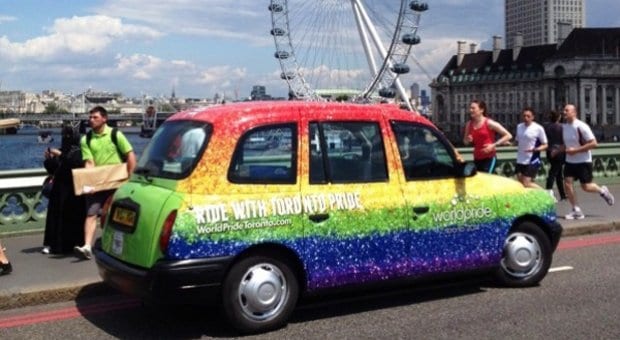Since it was announced in 2009 that Toronto would host WorldPride 2014, euphoric projections of exponential growth in Pride’s attendance, a legacy of making Toronto one of the world’s top LGBT travel destinations, and a multiplied economic impact have been taken for granted as the benefits of hosting what is hoped to be one of the largest celebrations of queer sexuality in the world.
But what if we host WorldPride and no one comes? It’s not unthinkable: each of the three previous WorldPride festivals has been something of a fiasco. WorldPride London 2012 was all but cancelled days before the event when the organization failed to pay its contractors.
Now, some community members say they worry that organizers aren’t doing enough to promote WorldPride to the global gay community.
“Friends of mine went on a three-week honeymoon in Australia, and I asked them if they saw anything there and not one thing,” says Brent Baker, part of a group who wrote an open letter to Pride Toronto urging it to step up advertising for the event. “It sounds like the same as London, just a two-week event, nothing special.”
Pride Toronto says it has dramatically increased marketing efforts in international tourism circles, which Torontonians may not recognize because they’re not the target audience.
“We have been targeting markets in South America and Brazil, specifically, across Europe, and we have upcoming events across the US and Canada,” says Trevor Hampden, Pride Toronto communications manager.
“Our tourism partners [Tourism Toronto] are very excited to be working with us,” Hampden says. “They’re telling us that hotels are being booked well in advance, and they expect hotels to be booked across the city.”
But a spokesperson from Tourism Toronto says that they have no such data.
“I don’t have any data on advance bookings for Pride. It’s always one of our busiest weekends of the year. We have every reason to be optimistic,” says Andrew Weir.
“Part of it is to have an expanded Pride; part of it is not just more people on the Sunday, but longer visits. It’s two weekends,” he says. “Pride Toronto has done a good job of filling both weekends with events to market.”
So how many people are we expecting anyway? Back in 2009, Pride’s then-executive director, Tracey Sandilands, told media, “WorldPride is going to be about five times bigger” than a normal Pride, which at the time was reported as being attended by one million people and having an economic impact of $136 million.
Pride Toronto’s current executive director, Kevin Beaulieu, reached in Berlin where he was doing promotional work, says the organization is aiming for two million total visitors over the two-week stretch.
“It’s not only getting people to come, but having them participating more while they’re here,” he says. “We’ll really know [how many attend] after the event has happened and we’ve had a chance to do our research.”
Weir says that the real impact of WorldPride Toronto won’t be measured in the number of tourists who visit this June, but in the establishment of Toronto as a premier destination for LGBT travel. The event, he says, will draw international attention and feed the local tourism industry for years to come.
“This is about establishing Toronto’s Pride as one of the Pride events to be at every year,” he says. “This is a long-term play; it’s not about June 2014.”
That’s part of the reason that marketing for the event has been, thus far, less about hiring major performers for the festival and more about touting Toronto’s broader appeal as an urban destination for culture, entertainment and dining.
“We’re not just marketing a village or a festival. We’re marketing a destination,” Weir says. “We’ve got to talk more broadly about why it’s in Toronto, what it says about Toronto, and what travel opportunities are here all year.
“If you’re one who likes cities, this should be high on the list. Ethnic diversity, integration of the gay and lesbian community throughout the city — that’s a big part of the experience.”
If this all sounds like a major shifting of the goalposts since 2009, it’s because it is.
“People get pretty euphoric when you talk about an event. There was also an expectation at the time that WorldPride London was going to be very successful and we could build off it,” Weir says. “Now we’re fighting back against the people who are aware of [London’s problems], are underwhelmed, and we’ve got to win them back. But most people are not aware of it.”
Still, Weir and Beaulieu say they have reason to believe WorldPride Toronto will be a success. Weir points to recently published articles in international gay magazines touting Toronto as a tourism destination — including a six-page spread in Australia’s DNA and another in Germany’s Siegessäule — as evidence that the global community has its eyes on the city. Beaulieu mentions that nearby Pride organizations are organizing bus trips to the festival.
“It will set a new standard for a Pride event. We’ll be capturing videos and testimonials,” Weir says. “It’s absolutely true that many people don’t know what WorldPride is. We’re explaining it. It’s effectively a first-time event.”
Even in a worst-case scenario, WorldPride Toronto is unlikely to face the calamities that struck previous installments in Rome, Jerusalem and London. Pride Toronto is a strong organization, with official government support — both financial and symbolic.
All the major candidates for mayor — with one notable exception — have pledged to march in the parade. Pride’s dwindling few political opponents have routinely been ineffective in cancelling, defunding or otherwise obstructing the parade.
With fewer than 80 days to the festival, Pride’s opponents have little time to orchestrate any moves against it. But Pride has just as little time to build a festival that lives up to the hype.


 Why you can trust Xtra
Why you can trust Xtra


